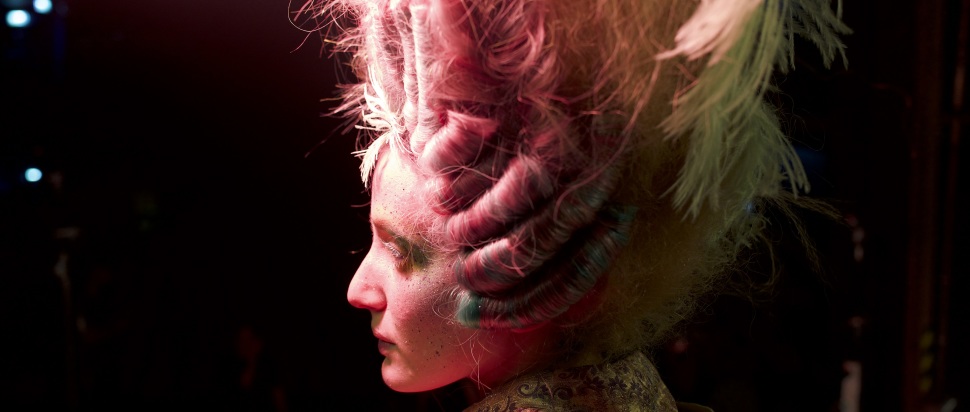Tom Hardiman on one-shot whodunnit Medusa Deluxe
Medusa Deluxe, a delirious murder mystery set at a hairdressing competition, is the most original British film of the year. We chat to director Tom Hardiman about his ingenious whodunnit, which seemingly unfolds in a single-shot
When Tom Hardiman joins our Zoom call, he’s out of breath and apologetic. His bike had a puncture, he explains, and his mobile ran out of charge. He’s a charming combination of enthusiastic, polite, and slightly chaotic. He’d make for a great character in his breathless murder mystery Medusa Deluxe.
Shot to look like a single take, it follows the entrants in a hairdressing competition when they discover one of their number has been murdered and brutally scalped. Bitter grudges and rivalries are unearthed as the camera follows the action, snaking along the corridors and through the dressing rooms of the building in which the competition is taking place.
The Skinny: This is almost an anti-murder mystery, where the death is the instigating incident but the mystery isn’t the point. Were you aiming to subvert those tropes?
Tom Hardiman: That’s the entire point of the film! I wrote it as a deconstructed murder mystery. I guess I was approaching it knowing that I was going to do long takes. Traditionally, if it was Frost or Morse or whatever, you have your red herring, your plot beat, and then you cut over here to something else. Whereas if you’re staying with the characters it suddenly becomes a character-led drama, and you can be much more playful with the context.
I was thinking about taking it apart as a genre almost, removing the detective, removing the exact nature of the murder. It was about subverting the conventions, trying to be playful, and actually just developing the genre, thinking about new places to take it. We’re storytellers, we want to break new ground and see where things can go.
The film is shot through with a wariness of artistic obsession, but how do you balance that with your filmmaking?
Yeah, that’s probably half the reason I’m interested in it. My first short film is about the history of British carpet making, and it’s got two characters who are obsessed with carpets. I think this through-line of passion verging on obsession is something I’m interested in. I’ve been around the creative world for a while now, since I came out of uni, and I’ve seen people who were on sets, brilliant at what they do, but it is a total life destroyer. There’s not many industries like it. I don’t know, cookery, maybe if you join the military. It really grabs you by the head, it’s like a headlock your entire life. I think you start to identify with that level of passion where it becomes all-consuming and you see it in all these ways. I think there’s another side to it – we’re making drama, and it allows you to go to extremes and push the boundaries of that.
What was it that drew you to the art of hairdressing specifically?
It’s the entire culture around it. You’ve got the high – it’s how we see and present ourselves to the world. From that side, culturally and individually, it’s incredibly important. And then you’ve got the low, where it is this hairdressing culture, the jokiness and the fun of it, and for me that’s how comedy works.
I feel like creativity is flat. We’ve got all these hierarchies, art here, film here, literature here. And hairdressing isn’t there, and people don’t respect hairdressing the way they should. I came from a background of contemporary art. What I started to notice, about 2012 or 2013, is they basically just made collages of pictures – they pushed together all these different references, they broke down the sculpture itself. So you suddenly saw the pillar, the artifice of the sculpture became apparent. And Eugene [Souleiman, renowned hairstylist and the film’s hair designer] has been doing that in hairdressing for 30 years.
He’s literally done the exact same thing, and yet because it’s hairdressing – the fashion industry knows how good he is, the hairdressing industry knows how good he is, but not everyone else does. And I want to bring the expertise and the skill of it to a wider audience. I think if Medusa could do that for hairdressing, make everyone go ‘bloody hell, it’s amazing’ I would be over the moon.
Why did you choose to use the one-shot format, and how did you achieve it?
It’s only really become possible recently, but it actually opens up options for you as a filmmaker. It poses questions to you – in the sense of what I was saying to you earlier, a murder mystery, staying with the character longer than you would traditionally, and how that changes the genre. You can get into a person’s space and really connect to them as a character. It’s almost more true to life. I feel like when you meet someone, you build a picture of them through what they say, rather than getting their entire backstory.
That’s how I want to write characters, but I think that’s also how you approach it with the camera if you’re doing a longer take. I’ve seen other filmmakers, they’ve been doing it for years and taking it on. I love it, I’m desperate to see what the next ten years brings from all these filmmakers who have grown up with the internet.
Medusa Deluxe is released 9 Jun by MUBI
The Skinny readers can see Medusa Deluxe early at The CineSkinny Film Club; free preview screenings at Summerhall, Edinburgh, 6 Jun and CCA, Glasgow, 7 Jun
